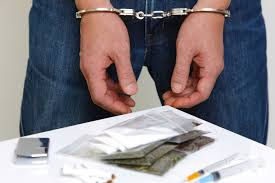Drug Possession: What can the Police do and what do they have to prove?
- Feb 21, 2017
- 4 min read
By Tyson Beckman
Drug possession charges are on the rise in New South Wales courts such as the Downing Centre and Waverley Court.
The latest BOSCAR crime statistics have seen an 11.5% increase in amphetamine possession and a 13% increase in possession of other drugs. So it is timely that we here at Vizzone Ruggero Twigg Lawyers take a look at what is possession and what can the police do?

Police Must Prove that you had possession, or custody of the prohibited drugs.
What is possession?
Under the Drug Misuse and Trafficking Act 1985, it is illegal to possess a prohibited drug. Although the quantity of each drug differs when a charge for possession of prohibited drug is heard before a Court, it must be proven that the prohibited drug was in your custody or control and that you knew that the prohibited drug was under your custody and control. Although this particular issue in relation to proving these points are generally left to lawyers to argue, it is a fact that is often not known by the general public.
What can the police do?
Under the Law Enforcement (Powers and Responsibilities) Act 2002, police are entitled to conduct searches on you, but only if they have reasonable grounds to suspect you are carrying prohibited drugs. The types of searches police can conduct include:-
Frisk Searches
External searches
Internal searches
A frisk search is the most common form of searches conducted by police. In a frisk search, a police officer can request for you to remove items such as jumpers or sweaters, shoes and socks, hats and may also search your pockets or look into any personal belongings you are carrying such as wallets, handbags or backpacks. A frisk search also extends to police asking to open up your mouth to look inside and for you to run and shake your fingers through your hair.
An external search, commonly known as a ‘strip search’ is another option police have if they believe on reasonable grounds that you are concealing any prohibited drugs under your clothing. A strip search must be undertaken with as much privacy as possible, out of the view of the general public and must be undertaken, as far as practicable, by a police officer of the same gender as you. Although a strip search may involve the removal of clothing, a strip search does not and must not involve internal searches of body cavities.
If, after a frisk or strip search is conducted and a police officer still suspects on reasonable grounds that you are concealing a prohibited drug, then the last type of search, being an internal search, may be conducted. As it obviously the most invasive of police searches, it requires an Order from a Magistrate or Judge before it can be conducted.
A question that often arises in relation to police powers is: what does ‘suspects on reasonable grounds’ actually mean?
A basic dictionary definition of the word ‘suspect’ means for someone to believe something to be true or it is likely to be probable. However, in the case of police searches, that suspicion must be reasonable and it will only be reasonable if the police officer has some facts or has made some observations, that would form more than a possibility in his or her mind, that you are in possession of drugs.
For example; if a police officer observed you leaving a bar, stumbling around and smelling of beer, it would, generally speaking, only be a reasonable suspicion that you are intoxicated from alcohol rather than in possession of drugs.
To the contrary, a common example of the police officer’s reasonable suspicion that someone is in possession of drugs, is the use of drug detection dogs, which are all too familiar sights at events and on the streets of New South Wales. If, for example, you are attending a music festival and a police drug detection dog sniffs you and then sits beside you, this gives a police officer reasonable grounds suspect you are carrying a prohibited drug.
If, you are in the situation where you are found to be in possession of prohibited drug, it is generally the case that you will be charged on the spot and issued with a Court Attendance Notice, to attend Court at later date, for your charge to be heard before a Magistrate or Judge.
It is important that you obtain quality legal advice as the range of penalties for drug possession can range from lenient to severe (including imprisonment). It may be that for a first time offender with a low quantity of a prohibited drug that they may be able to obtain a Section 10 which means they will be found guilty but will not proceed to having a conviction recorded against them.
At Vizzone Ruggero Twigg lawyers, we are able to provide advice and assistance to anyone who has found themselves issued with a fine or charge for possession of a prohibited drug. We have appointments available with our team in both our Sydney CBD office and also our Mascot office. Call now on 02 96671271 or email us at law@vrtlawyers.com.au.



Comments